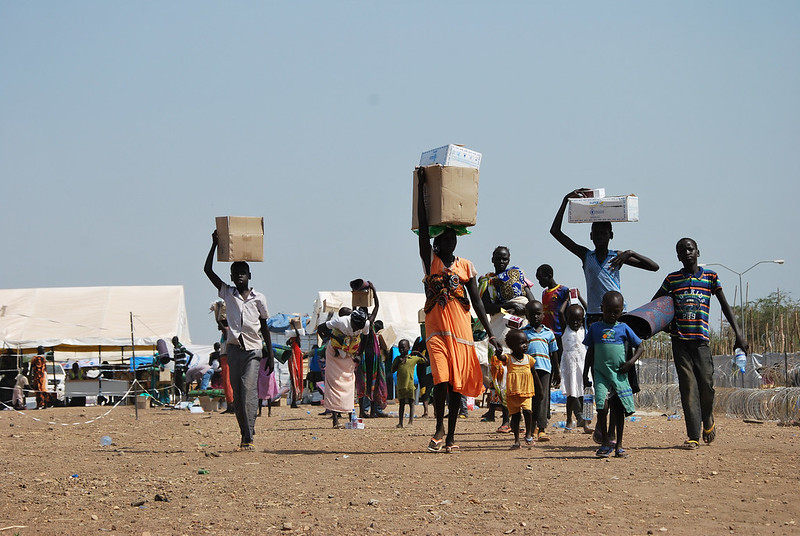The Arab Spring: Addressing Poverty in Sudan

The term “Arab Spring” characterized a series of upheavals across the Middle East and North African regions (MENA) in which a surge of citizens defied their authoritarian governments. It all started in Tunisia in 2010 when a man set himself on fire in a demonstration against police corruption. Sudan joined the anti-oppression movement in an effort to eradicate oppression and poverty in Sudan soon after. Now, a decade and a new government later, the country finds itself in an ideal position to begin seriously addressing poverty in Sudan.
A Tragic History
For many years, the Sudanese have suffered the brutal dictatorship of an authoritarian regime. In 2003, Sudan People’s Liberation Army (SPLA) and the Justice and Equality Movement (JEM) took up arms against their government in Darfur. These groups launched attacks against government facilities and army facilities in an attempt to obtain more financial and democratic power for the citizens. The subsequent conflict became known as the Darfur Genocide.
Both Sudan’s government, headed by President Omar al-Bashir, and the movements that opposed it were non-Arab. This conflict led to the deaths of around 15,000 people and the uprooting of millions of citizens. Bashir created a country dichotomized into Arabs and Africans, as opposed to a country that acted as a home for all Sudanese people. These conditions laid the foundation for the Bashir administration’s oppression of the Sudanese people. In 2011, the stage was set for the Arab Spring in Sudan. As a result of these protests, violence erupted. Throughout, Bashir retained his presidency.
Economic Challenges
Poverty in Sudan and socioeconomic woes increased following July 2011, when South Sudan gained independence from Sudan after Africa’s longest-running civil war. Considering most oil fields prospered in the south of the country, the most significant price Sudan paid was the loss of oil profits. As a result, Sudan’s inflation went rampant, provoking major upset among the Sudanese. The younger generations found it exceptionally challenging to find a job. Instead of addressing these issues, Sudan used most of its resources for military purposes. Additionally, a drought worsened Sudan’s already restrictive agricultural policies.
The failure of the industrial labor market caused unemployment and poverty to spread. The absence of economic opportunity prompted Bashir to eradicate nearly all civil society organizations. As a result, human rights and labor units shut down. Conjointly, due to Bashir’s Islamic leadership, women experienced extreme restraints. Indeed, Sudanese people experienced their basic rights stripped from them and those they loved, leaving them with exceptionally limited freedom.
Poverty in Sudan prevailed when bread, a basic food, became unaffordable. Violence and economic struggles contributed greatly to the oppression of the Sudanese people. However, the loss of affordable access to the most basic aspect of life, food, triggered the people to rise up and demand change.
New National Solidarity
One catalyst driving the protests was the desegregation of the different factions of Sudan. New national solidarity arose in recent years with the hope of ending Bashir’s rule. It was no longer Arabs verse the Africans. One example illustrating this was the chants throughout the northern and southern parts of Sudan beginning in late 2018. Multi-ethnic protestors chanted “we are all Darfur” while Darfur’s protestors chanted “we are all Khartoum,” demonstrating solidarity across the different religions and ethnicities of Sudan.
As the protests gained momentum, many more joined in hopes of replacing the regime with a government that could recover some of the economic loss. Public opposition groups played a key role in even the poorest communities. This ensured that everyone’s voices were on display despite their economic status. Women also took to the streets to protest the mistreatment they had experienced over the years, proving that all segments of Sudanese society engaged and committed themselves to the revolution.
A Successful Revolution
Sudanese citizens again requested Bashir to resign, but he refused. The government reacted violently, murdering a number of protestors. This only served to further outrage and inspire demonstrators around the country. Finally, the opposition assembled peacefully outside Sudan’s military headquarters in Khartoum, the capital, demanding Bashir’s resignation.
Critically, the revolution attained military assistance despite the military being a fundamental pillar of Bashir’s rule. In the face of the massive scale of the uprisings, the military began wavering in its support of Bashir. Leaders eventually determined that self-preservation was the only choice, and the military deposed the dictator.
Sudan Today
Despite the success in overthrowing Bashir, poverty in Sudan remains a major issue. Some 36% of the population lives below the poverty line. Poverty in Sudan exacerbates other issues, resulting in approximately 1 million children experiencing global acute malnutrition.
Due to its perseverance, Sudan is experiencing rebuilding. Many organizations are addressing poverty in Sudan. The United Nations Children’s Fund (UNICEF) is assisting in the establishment of early childcare programs in Darfur, Sudan. Additionally, the organization is going through an appeal process to raise $211 million to assist in humanitarian efforts. Some of the targeted recipients include 7.4 million children and 2.5 million internally displaced persons. Another organization committed to aiding the next generation of Sudan is Save the Children. In 2020, it helped 374,000 children by addressing poverty in Sudan through nourishment, education, protection and crisis aid. Doctors Without Borders also aims to improve the severely-lacking health care in Sudan.
A Brighter Future
The Sudanese have always fought for human rights and against tyranny. They triumphed due to their tenacity, finally ending a dictatorship that lasted for 30 years. Now, with support from its international allies, Sudan is undeniably on its road to alleviating the effects of poverty.
– Tiffany Lewallyn
Photo: Flickr
